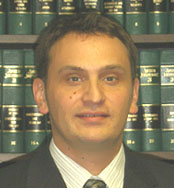

| THE SAINT PAUL PERSONAL INJURY ATTORNEY |
 |
 |
|
NO-FAULT - income-loss benefits for employee sole shareholder of employerSTATE OF MINNESOTAIN COURT OF APPEALS A06-291 Kenneth Neutgens, Respondent, vs. Westfield Group, Appellant. Filed December 5, 2006 Affirmed Lansing, Judge Hennepin County District Court File No. 27-CV-05-011913 Robert W. Owens, Jr., Owens Law, L.L.C., 5270 West 84th Street, Suite 300, Bloomington, MN 55437 (for respondent) Deborah C. Eckland, Alan P. King, Goetz & Eckland P.A., Exposition Hall at Riverplace, 43 Main Street Southeast, Suite 400, Minneapolis, MN 55414 (for appellant) Considered and decided by Minge, Presiding Judge; Lansing, Judge; and Klaphake, Judge. S Y L L A B U S Income-loss benefits under the Minnesota No-Fault Automobile Insurance Act include compensation for the salary loss of an employee who is the sole shareholder of the employing corporation and are not contingent on proof that the employee’s injuries resulted in a reduction of the corporation’s gross business income. O P I N I O N LANSING, Judge Westfield Group, an issuer of automobile insurance policies, appeals from the district court’s denial of Westfield’s motion to vacate an arbitration award of income-loss benefits under the Minnesota No-Fault Automobile Insurance Act. Westfield argues that the arbitrator exceeded his authority when he allowed the insured, an employee of a corporation in which he is the sole shareholder, to prove income loss by establishing the amount of salary loss as a result of his accident-related injuries without demonstrating a decrease in the corporation’s gross business income. We affirm. F A C T S An arbitrator awarded Kenneth Neutgens ,000 in income-loss benefits under the Minnesota No-Fault Automobile Insurance Act for injuries sustained in a November 2002 automobile accident. At the arbitration hearing Neutgens presented medical evidence of the extent and severity of injuries to his head and spine. Neutgens was hospitalized for two nights and recuperated at home for several months following the accident. To establish his accident-related income loss, Neutgens provided his W-2 income-tax forms. Neutgens, who owned and operated an excavating business, testified that the injuries sustained in the accident prevented him from performing the responsibilities that he had previously performed for the corporation. These responsibilities included handling the bidding, telephones, receivables, payables, and also grading, excavating, repairing equipment, and transporting equipment and parts. Neutgens’s testimony describing his reduced ability to function physically and cognitively was supported by medical records and additional testimony from his wife and son. Because Neutgens could not perform his usual work responsibilities after the accident, he stopped drawing his usual salary. Westfield Group, Neutgens’s insurer, withheld Neutgens’s income-loss benefits because Neutgens did not submit the income-tax records for his excavating business. At the hearing Westfield argued that the applicable legal standard required Neutgens to prove a reduction in his gross business income to establish income-loss benefits. Neutgens provided the corporation’s income-tax records but disputed Westfield’s argument that they were necessary to establish his income loss. The arbitrator rejected Westfield’s argument and based the award on Neutgens’s reduction in salary. Westfield moved in district court to vacate the arbitration award. As the basis for its motion, Westfield argued that the arbitrator had exceeded his authority by holding that Neutgens was not required to prove a reduction in his gross business income in addition to his loss in salary. The district court denied Westfield’s motion and confirmed the award. Westfield now appeals. I S S U E Did the arbitrator exceed his authority when he determined income-loss benefits under the Minnesota No-Fault Automobile Insurance Act by calculating the salary loss of the injured employee of a corporation in which he is the sole shareholder, without requiring proof of a reduction in the corporation’s gross income? A N A L Y S I S Under Minnesota law, an arbitrator’s findings of fact are final, but courts must vacate arbitration awards when arbitrators exceed their authority. Minn. Stat. § 572.19, subd. 1(3) (2004); Karels v. State Farm Ins. Co., 617 N.W.2d 432, 434 (Minn. App. 2000). No-fault arbitrators exceed their authority when they interpret rather than simply apply the Minnesota no-fault insurance statutes. Johnson v. Am. Family Mut. Ins. Co., 426 N.W.2d 419, 421 (Minn. 1988); see also Weaver v. State Farm Ins. Cos., 609 N.W.2d 878, 882 (Minn. 2000) (“[N]o-fault arbitrators are limited to deciding questions of fact, leaving the interpretation of law to the courts.”). To determine whether a no-fault arbitrator has interpreted, rather than applied, the law, we review de novo “the arbitrator’s legal determinations necessary to granting relief.” Weaver, 609 N.W.2d at 882. On appeal Westfield does not dispute that Neutgens was a salaried employee of the corporation before the accident or that Neutgens was unable to work after the accident. Westfield’s sole argument is that the arbitrator exceeded his authority because Minnesota no-fault law requires a self-employed business owner to prove income loss by demonstrating a reduction in gross business income rather than a loss of salary. Our review of the relevant statutes and case law shows that the arbitrator correctly applied the law. The Minnesota No-Fault Automobile Insurance Act provides that an insured may receive up to ,000 for income loss arising out of injuries sustained in an auto accident. Minn. Stat. § 65B.44, subd. 1(a)(2) (2004). The Act defines income as “salary, wages, tips, commissions, professional fees, and other earnings from work or tangible things of economic value produced through work in individually owned businesses, farms, ranches or other work.” Minn. Stat. § 65B.43, subd. 6 (2004). Thus, in the ordinary case, an insured receives income-loss benefits by establishing that accident-related injuries resulted in a loss of personal income evidenced by a reduction in salary, wages, tips, commissions, or fees. Westfield argues that this method of determining income loss does not apply to Neutgens because he was the sole shareholder of the corporation that employed him. For this argument, Westfield relies on language in Rotation Eng’g & Mfg. Co. v. Secura Ins. Co., 497 N.W.2d 292 (Minn. App. 1993). In Rotation, the business owner was paid a salary, but his salary was not reduced when he missed 339 hours of work as a result of his disability. 497 N.W.2d at 293-94. Because there was no decrease in the business’s gross income, the business owner was ineligible for income-loss benefits. Id. at 295. In reaching this conclusion, the court discussed the computation of income-loss benefits for a self-employed person. Id. at 294. The opinion states that if the “gross income produced by a self-owned business has decreased during the period of the self-employed owner’s disability, and the decrease is attributable directly and solely to the owner’s disability, that decrease, in the absence of any salary or wage paid, represents ‘other earnings from work.’” Id. at 294 (quotation omitted) (emphasis added). Westfield’s reliance on this language as support for its argument is flawed in two significant ways. First, the language is directed, by its own terms, to claims for income loss “in the absence of any salary or wage paid.” Because it is undisputed that Neutgens received a salary, the language does not apply to Neutgens’s claim. Second, the language is directed at establishing “other earnings from work,” which is a method of demonstrating income loss when the injured claimant does not have available the usual measures of salary, wages, tips, commissions, or professional fees. See Minn. Stat. § 65B.44, subd. 3 (2004) (listing types of earnings that qualify as income). The language in Rotation is drawn from, and substantially consistent with, Rindahl v. Nat’l Farmers Union Ins. Cos., 373 N.W.2d 294 (Minn. 1985). In Rindahl, the court examined an income-loss claim for a farm co-owner who did not receive a wage or salary for farm work. Id. at 298-99. The court recognized that “the self-employed person who takes no salary or wage from the business may recover income loss benefits by proving . . . loss of ‘other earnings from work.’” Id. at 299. Because Rindahl did not receive a wage or salary, she could not demonstrate a decrease in the ordinary way but, under the statute, could attempt to show the loss of “other earnings from work.” Id. The Rindahl court held that, although Rindahl’s evidence was not adequate to demonstrate an accident-related loss of earnings, the statute would allow a self-employed individual, who did not receive a salary or wage, to prove loss of “other earnings” if the individual could show that the loss was directly attributable to the individual’s injuries. Id. But Rindahl does not require that a salaried employee who is the sole shareholder of the employing corporation must demonstrate not only a loss of wages or salary, but also a loss in business earnings. Unlike Rindahl, Neutgens took a salary from the corporation. Thus, Neutgens was able to demonstrate his loss by showing the decrease in his salary. Contrary to Westfield’s argument, neither Rindahl nor Rotation holds that a reduction in gross business income is the only means by which a self-employed person can prove income loss. Rather, each case acknowledges that gross business income is a satisfactory gauge of loss for a self-employed person when the ordinary measures are unavailable. The Act recognizes that when the customary measures of “salary, wages, tips, commissions, or professional fees” are not available, income may be determined by showing “other earnings” from work or economic production in an individually owned business. Minn. Stat. § 65B.43, subd. 6. It is undisputed that Neutgens drew a salary before his auto accident. Consequently, it is unnecessary to resort to proof of individual earnings through other means. Following the accident, Neutgens stopped drawing a salary because his injuries prevented him from returning to work in his preaccident capacity. Westfield does not dispute that Neutgens’s inability to work was caused by his injuries. As a salaried employee, Neutgens demonstrated a statutorily-defined measure of income for the arbitrator to consider in reaching his decision on loss attributable to the accident. Neutgens was not required to prove by alternative means what he could demonstrate by primary means. We recognize that a claimant who is the sole shareholder of the employing corporation will likely have the power to influence the amount of his or her postaccident salary. But “loss” is defined as the “economic detriment resulting from the accident causing the injury.” Minn. Stat. § 65B.43, subd. 7 (2004). Thus the arbitrator determines, as a fact question, whether the income loss is “proximately caused” by the injury. See Minn. Stat. § 65B.44, subd. 3 (2004) (providing for disability and income-loss benefits); Keim v. Farm Bureau Ins. Co., 482 N.W.2d 823, 825 (Minn. App. 1992), review denied (Minn. May 21, 1992) (stating that actual amount of income loss is factual question for arbitrator). In this case, however, it is undisputed that Neutgens’s personal-income loss was directly and solely attributable to his injuries. In allowing Neutgens to pursue his claim by proving personal-income loss, the arbitrator applied existing law. “Having been required merely to apply, and not to interpret, plain, settled law, the arbitrator did not exceed his authority.” Karels, 617 N.W.2d at 435. D E C I S I O N Because Minnesota no-fault law permits an individual to prove income loss by showing a reduction in personal income and does not exclude individuals who are employed by corporations in which they are the sole shareholder, the arbitrator did not exceed his authority by relying on the individual’s salary loss to demonstrate this income loss, and we affirm the district court. Affirmed. |
|||||||||||||||||||||||||||||||||||||||||||||||||||||||||||||||||||||||
| By visiting this page or clicking the "submit" button above, you agree that you have read and accept this "disclaimer". |
||||||||||||||||||||||||||||||||||||||||||||||||||||||||||||||||||||||||
| Copyright ©
Michael E. Douglas, Attorney at Law, Saint Paul MN. All Rights
Reserved. Minnesota Lawyer representing Personal Injury, Car / Auto Accident, Workers Compensation, Medical Malpractice, Social Security Disability claims. Dedicated to Injured Workers, Victims of Negligence, Car Accidents, Victims of Fraud, and those in need of legal assistance. |